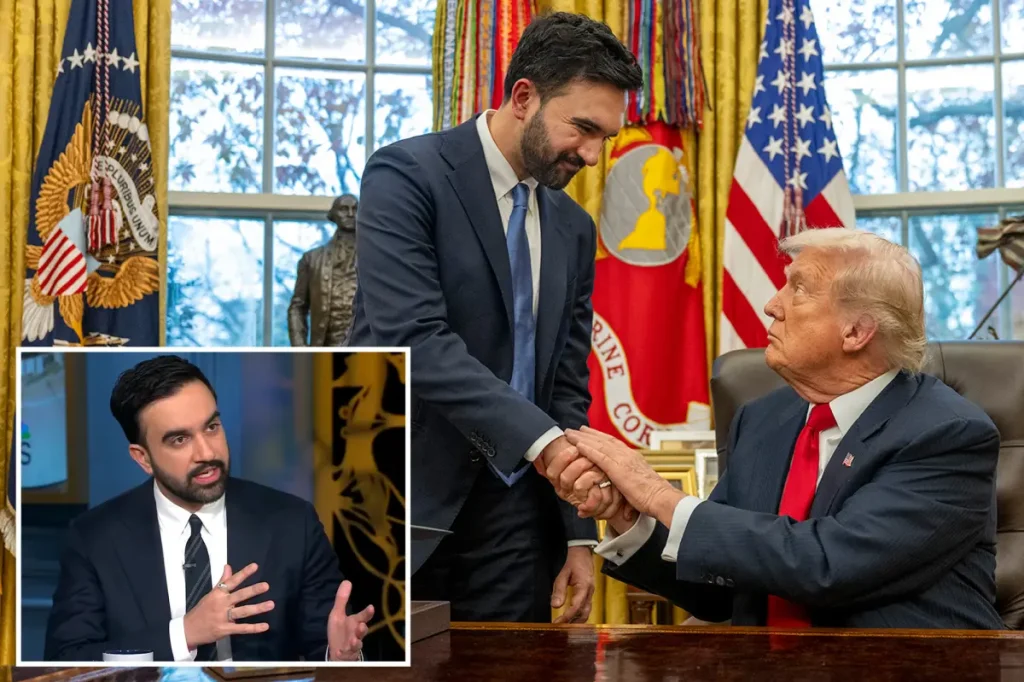NYC Mayor-Elect Mamdani Stands Firm on Trump Criticism While Seeking Common Ground
In a revealing interview on NBC’s “Meet the Press,” New York City Mayor-elect Zohran Mamdani did not back away from his past characterization of President Donald Trump as a “fascist” and “despot,” yet emphasized his commitment to working with the administration on shared concerns. “That’s something that I’ve said in the past. I say it today,” Mamdani stated when directly questioned about his views on Trump. However, the Democratic Socialist mayor-elect highlighted the surprisingly productive meeting he had with the President at the White House, suggesting that political differences need not preclude collaboration on issues affecting everyday New Yorkers. Their Oval Office encounter showcased an unexpected dynamic when a reporter asked Mamdani if he still considered Trump a fascist. “That’s OK. You can just say yes,” Trump interjected as Mamdani prepared to navigate the question. “It’s easier than explaining it. I don’t mind.” This candid exchange reflected the unusual political relationship forming between two leaders from opposite ends of the spectrum who nonetheless recognize practical needs that transcend ideology.
The cornerstone of their potential cooperation, according to Mamdani, is addressing the affordability crisis gripping New York City. The mayor-elect explained that both he and Trump secured their electoral victories largely because voters are deeply concerned about the high cost of living. In his conversations with New Yorkers from traditionally Democratic areas like Fordham Road in The Bronx and Hillside Avenue in Queens who voted for Trump, Mamdani discovered a consistent theme: “I shared with the president that when I asked those New Yorkers why did they vote for the president, they told me again and again it was cost of living, cost of living, cost of living.” This common ground provided the foundation for their discussion, with both leaders acknowledging that the city’s housing crisis requires immediate attention, regardless of their broader political disagreements.
Mamdani expressed optimism about Trump’s familiarity with New York City’s complex development landscape, noting that their conversation delved into specific obstacles to creating affordable housing. As a former real-estate developer, Trump understands the city’s restrictive zoning regulations and the cumbersome Land Use Review Procedure (ULURP) that developers must navigate. “We spoke about the need to change so many of those situations such that a developer doesn’t tell you the thing more expensive than labor or materials is waiting,” Mamdani recounted. This technical discussion demonstrated how their shared understanding of New York’s housing challenges could potentially transcend partisan divisions, focusing instead on practical solutions to make the city more affordable for residents struggling with rising costs.
While maintaining his progressive stance on taxation, Mamdani showed flexibility regarding implementation of his ambitious agenda. He continues to support proposals to increase taxes on millionaires and corporations to fund key initiatives like free childcare, free public buses, and expanded affordable housing. However, he acknowledged that these measures would require approval from Governor Kathy Hochul and the state legislature. Demonstrating pragmatism, Mamdani signaled openness to alternative funding mechanisms: “And what I’ve also said is more important than how we fund something is that we fund something. And if there are additional or alternate revenue streams to do so, I will accept them, and I will celebrate them because the most important thing is to actually deliver for the New Yorkers who, right now, can’t even conceive of having a family in New York City because of how expensive we’ve made childcare across the five bureaus.”
On public safety, Mamdani held firm to his position that New York City’s current police force of approximately 35,000 officers is sufficient, despite Police Commissioner Jessica Tisch’s advocacy for expansion. This stance reflects his broader vision for addressing crime through social investments rather than increased policing. The retention of Commissioner Tisch in his administration, despite their differing perspectives on department staffing, demonstrates Mamdani’s willingness to maintain experienced leadership while bringing his own priorities to city governance. The mayor-elect appears to be striking a balance between his progressive ideals and the practical requirements of running America’s largest city, recognizing that effective governance often requires cooperation across political divides.
The emerging relationship between Mamdani and Trump highlights a potential path forward in an era of intense political polarization. Despite fundamental ideological differences and Mamdani’s unflinching criticism of the President, both leaders appear willing to set aside partisan hostilities in service of their constituents’ needs. This pragmatic approach reflects the complex reality of governance, where effective leadership often requires finding common ground with political opponents. As Mamdani prepares to take the helm of New York City, his ability to maintain his progressive principles while engaging constructively with the Trump administration will be closely watched by political observers across the spectrum. The mayor-elect’s early interactions suggest he is attempting to chart a course that prioritizes delivering tangible benefits to New Yorkers over ideological purity, a strategy that acknowledges the practical challenges of governing in a divided political landscape.


